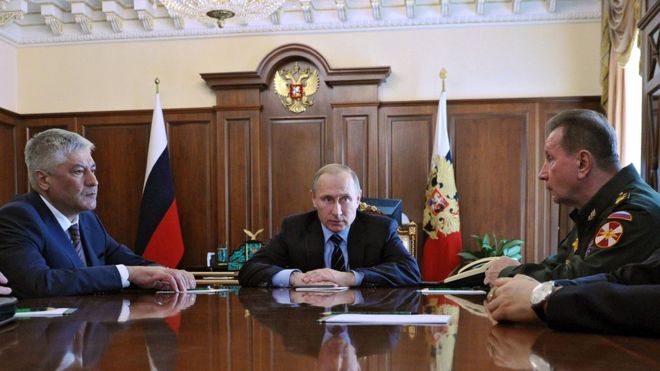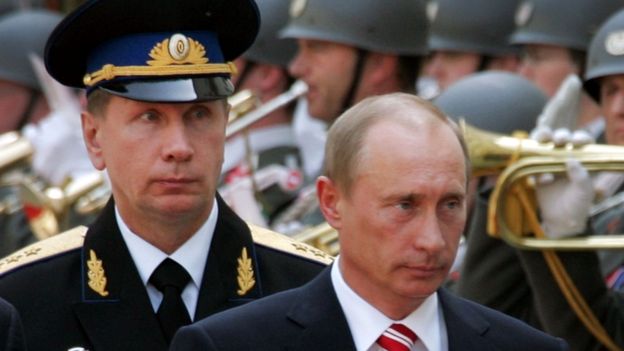Putin creates new National Guard in Russia 'to fight terrorism'
- 7 hours ago
- Europe
 AFP
AFP
Russian President Vladimir Putin has announced the creation of a new National Guard, which he said would fight terrorism and organised crime.
The force will be formed of interior ministry troops and led by Mr Putin's former bodyguard, Viktor Zolotov, who will report directly to the president.
Mr Putin's spokesman said the force could be used to maintain public order.
But Dmitry Peskov denied its creation was linked to elections in September. Some critics say Mr Putin fears unrest.
Mr Putin made the announcement during a meeting with key security officials at the Kremlin. "The decisions have been taken, we are creating a new federal body of executive power," he said.
He also announced that Russia's drug control agency and federal migration service would become part of the interior ministry's remit.
Why now?
The creation of a National Guard has been talked about for years. Mr Peskov said he "could not explain" the timing but denied it had anything to do with upcoming elections or any mistrust of other law-enforcement agencies.
But there are suggestions that President Putin is concerned about possible unrest in the run-up to parliamentary elections in September.
Liberal Yabloko party leader Emilia Slabunova said it was an "attempt by the authorities to protect themselves from protests" while independent military analyst Alexander Golts said Russian authorities were concerned by "colour revolutions" in neighbouring countries such as Ukraine and Georgia.
Who's in favour and who's against?
Pro-Kremlin officials have welcomed the change, but opposition figures and commentators fear a further strengthening of security structures.
Chechen leader Ramzan Kadyrov said the new force would "enhance units' operational capability". The head of the State Duma's defence and anti-corruption committee, Irina Yarovaya, said it was "an absolutely timely, adequate and systemic answer to modern challenges and threats".
But Communist MP Vladimir Rodin said the reshuffle was "a dangerous path" and influential cultural figure Marat Gelman called it a "step towards a police state".
What happens next?
The National Guard looks set to become a powerful force. Its proposed powers include the right to shoot or use force without warning and enter private premises while on duty when there is a threat to the lives of civilians or National Guard personnel.
Some unconfirmed reports suggest it could number up to 400,000 people and havetanks, heavy artillery and attack helicopters. What is not clear is how the new force will work with the interior ministry and other security agencies.
Analysis by BBC Monitoring
As commander-in-chief of the National Guard, Mr Zolotov has been given a seat on Russia's Security Council. This means he will report directly to President Putin, bypassing the interior minister.
Mr Putin warned in February that Russia's "foes abroad" were preparing to interfere with the 18 September election, and told the country's security services that such attempts must be thwarted.
Moscow has long accused the West of trying to influence Russian elections through encouraging mass protests - a claim denied by US and European officials.
Thousands of protestors took to the streets in Moscow and other cities after the 2011 parliamentary elections amid allegations of ballot-rigging and electoral fraud. Dozens of opposition figures were arrested and jailed.
 AFP
AFPRise of Viktor Zolotov
Little is known about 62-year-old Viktor Zolotov. He tends to stay out of the media spotlight and usually refrains from making political statements. But most commentators agree that his appointment is the outcome of his close relationship and his loyalty to the Russian president.
Born into a working-class family, Mr Zolotov started his career as a locksmith at a car plant, later joining the KGB. He spent 20 years as a guard with the Soviet security agency.
In 1994, he became bodyguard for then St Petersburg Mayor Anatoly Sobchak and deputy mayor Vladimir Putin. That was when he apparently developed a close relationship with the future president, even becoming his judo sparring partner.
When Mr Putin was appointed prime minister in 1999, Mr Zolotov was made head of his security entourage. He held the post until 2013, when he was transferred to the interior ministry and put in charge of interior troops in 2014.

No comments:
Post a Comment